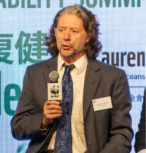DNA reveals the past and future of coral reefs
New DNA techniques are being used to understand how coral reacted to the end of the last ice age in order to better predict how they will cope with current changes to the climate. James Cook Univer

From 2005 to 2022, the main node of the ARC Centre of Excellence for Coral Reef Studies was headquartered at James Cook University in Townsville, Queensland (Australia)








Abstract:
The harsh truth is that, despite exciting innovations and increases in activity, ocean conservation is not succeeding, at least not fast enough. This is my conclusion from the last decade or two, including work in the Australian government, national and regional community work in Indonesia, collaborations on southern Chinese coral reefs, and leading a program in Hong Kong, a global center for trade in seafood, shark-fin, and investment, finance and banking. As a scientist, I am forced to consider why this is, and what we need to do about it. In this talk, I’ll share some of my perspectives on some of the conventional wisdoms of conservation, suggesting that we need to engage much more substantively with economics, and with policy and law, at all levels. Environmental damage, in oceans and on land, result from human activity, and the vast majority of human activity is undertaken by, or mediated by, business, yet conservation effort has largely focused on individual action and government-led policy. The business and finance sectors are moving toward more engagement with conservation, but the moves are fraught with greenwashing (a polite term for fraud) and far too limited in scope, scale and rate. I’ll also share some suggestions on recent developments, such as ocean accounting and “bankable nature solutions”, that can provide leverage to drive much greater and more effective change. I’ll aim to illustrate many of the problems, and emerging (I hope) solutions, with the Hong Kong sustainable seafood campaign.
Bio:
Laurence works in science-based management and conservation of marine ecosystems and is currently Director of Oceans Conservation for WWF Hong Kong. He has a Ph.D. from Dalhousie University, in Canada, and around 35 years’ experience, especially working on coral reefs in Australia, Indonesia and the “Coral Triangle”, the Pacific and Caribbean, as well as temperate ecosystems, and about 75 peer-reviewed, scientific publications. Laurence is an adjunct Professorial Research Fellow at the Centre of Excellence for Coral Reef Studies, James Cook University, and Visiting Professor at Hasanuddin University, in Makassar, Indonesia. Laurence’s previous roles include a President’s International Visiting Professorial Fellowship from the Chinese Academy of Sciences, Senior Advisor to the Marine Program of Conservation International in Indonesia, more than 12 years at the Great Barrier Reef Marine Park Authority, and 12 years as a coral reef ecologist at the Australian Institute of Marine Science. He has served extensively on high-level advisory boards, and works with government, academic/research, non-government and industry / corporate sectors and international and UN bodies. In 2005, Laurence was awarded a Pew Fellowship in Marine Conservation, which focused on enhancing the resilience of coral reefs and marine protected areas to climate change.
New DNA techniques are being used to understand how coral reacted to the end of the last ice age in order to better predict how they will cope with current changes to the climate. James Cook Univer
A new study on the effects of climate change in five tropical countries has found fisheries are in more trouble than agriculture, and poor people are in the most danger. Distinguished Profess
James Cook University researchers have found brightly coloured fish are becoming increasingly rare as coral declines, with the phenomenon likely to get worse in the future. Christopher Hemingson, a
Researchers working with stakeholders in the Great Barrier Reef region have come up with ideas on how groups responsible for looking after the reef can operate more effectively when the next bleaching
Abstract: As marine species adapt to climate change, their heat tolerance will likely be under strong selection. Individual variation in heat tolerance and its heritability underpin the potential fo
Abstract: The Reef Ecology Lab in KAUST’s Red Sea Research Center explores many aspects of movement ecology of marine organisms, ranging from adult migrations to intergenerational larval dispersal
Abstract: Macroalgal meadows are a prominent, yet often maligned component of the tropical seascape. Our work at Ningaloo reef in WA demonstrate that canopy forming macroalgae provide habitat for ad
Abstract: Sharks are generally perceived as strong and fearsome animals. With fossils dating back at least 420 million years, sharks are not only majestic top predators but they also outlived dinosa
Abstract: Connectivity plays a vital role in many ecosystems through its effects on fundamental ecological and evolutionary processes. Its consequences for populations and metapopulations have been
Abstract: Evolution of many eukaryotic organisms is affected by interactions with microbes. Microbial symbioses can ultimately reflect host’s diet, habitat range, and even body shape. However, how
Abstract: The past few years have seen unprecedented coral bleaching and mortality on the Great Barrier Reef (GBR) but the consequences of this on biodiversity are not yet known. This talk will expl